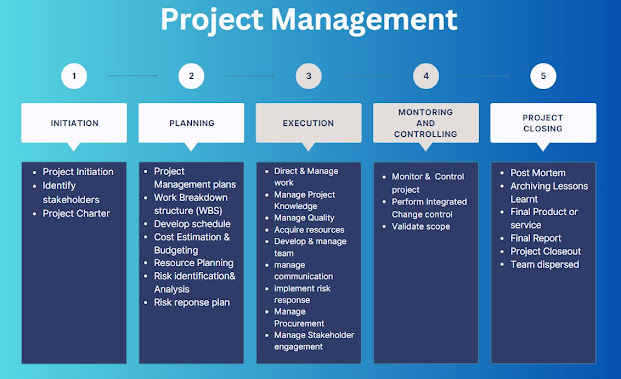Introduction:
Project management is the process of planning, organizing, and controlling resources to achieve specific goals and objectives within a defined timeframe. It is a discipline that involves a wide range of activities, including defining the project’s scope, developing a project management plan, managing the project team, and monitoring and controlling project performance.
Effective project management is crucial to the success of any organization. It allows organizations to complete projects within budget, on time, and to the satisfaction of stakeholders. Project management is used in various industries, including construction, engineering, healthcare, and technology.
Five Phases in Project Management:
The project management process consists of five key phases: initiation, planning, execution, monitoring and controlling, and closing. Let's take a closer look at each of these phases:
- Initiation:
- The initiation phase is where the project is defined and authorized.
- It is the stage where the project manager works with stakeholders to determine the project's purpose, objectives, and scope.
- The project manager also identifies potential risks and creates a project charter, which outlines the project's scope, budget, and timeline.
- Planning:
- During the planning phase, the project manager creates a project management plan that outlines the project's scope, objectives, and timeline.
- The project manager also identifies the resources required to complete the project and develops a project schedule.
- Additionally, the project manager creates a risk management plan to identify potential risks and develop strategies to mitigate those risks.
- Execution:
- The execution phase is where the actual work of the project takes place.
- The project manager and the project team carry out the project's tasks and activities as defined in the project plan.
- The project manager oversees the project team, manages the project schedule, and ensures that the project is on track.
- The project manager must also communicate regularly with stakeholders to keep them informed of the project's progress.
- Monitoring and Controlling:
- The monitoring and controlling phase involves tracking the project's progress and making any necessary adjustments to ensure that the project stays on track.
- The project manager monitors the project's performance, compares it to the project plan, and identifies any variances.
- If any issues arise, the project manager works with the project team to make adjustments and keep the project on track.
- Closing:
- The final phase of project management is closing.
- This phase involves completing the project and transitioning it to the stakeholders.
- The project manager works with the project team to ensure that all project tasks have been completed, and all deliverables have been met.
- Additionally, the project manager prepares a final project report and conducts a project review to identify any lessons learned that can be applied to future projects.
Project Management Skills
Effective project management requires a combination of technical, leadership, and communication skills.
Project managers must be able to manage teams, allocate resources effectively, and communicate with stakeholders effectively.
Additionally, they must have a deep understanding of project management methodologies, tools, and techniques.
Conclusion
In conclusion, project management is a critical discipline that involves a wide range of activities aimed at achieving specific goals and objectives within a defined timeframe.
Effective project management allows organizations to complete projects within budget, on time, and to the satisfaction of stakeholders.
By following the five phases of project management - initiation, planning, execution, monitoring and controlling, and closing - project managers can ensure that their projects are successful and deliver value to the organization.






No comments:
Post a Comment